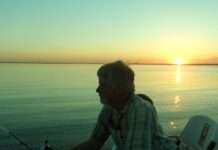Anistasiya James, the new director at the Karpov International Chess School in Lindsborg, gave an inspired talk recently to the Kiwanis Club, recounting the sport’s 1,500-year history and its effect in the education of young and old(er) alike. Chess helps to sharpen critical and abstract thinking, planning and analytical skills and sportsmanship, she said.
And this: “Armenia was the first country in the world to mandate chess education in schools.” Anistasiya is a former official with the Uzbekistan Chess Federation. She comes to Lindsborg via New York City, where there she had been in accounting and civil engineering, and had taught at the university level for 15 years. She is also the mother of international chess Grandmaster Timur Gareyev, and succeeds her busy son as director of the Karpov school. Mother and son are from a region of heavy influence in chess, and with a rich history in Lindsborg. Thus from a decade ago (2004-05) we recall a few events that brought chess in the Smoky Valley to heightened status over the world.
*
THE KARPOV school evolved in Lindsborg in the early 2000s, largely from the influence and connections of its first director, Mikhail Korenman, a Russian (PH.D., chemistry) who was at the time teaching at Bethany College. Korenman had a passionate appetite for competitive chess and for teaching the sport. Chief among Korenman’s early partners was Irwin (Wes) Fisk, a retired private investigator and chess expert who had moved to Lindsborg from Pasadena, Calif., with his wife Suzie. (They have since moved to Washington state.) Fisk was also a senior writer for Chess Life, a widely distributed publication (circ.100,000) of the U.S. Chess Federation. Fisk also had connections. He and Korenman in short time began to call on their friends, drawing increasing participation of international competitors at matches in Lindsborg.
Among the interested was Anatoly Karpov, a seven-time world champion who, on Korenman’s invitation, had twice visited Lindsborg. In March 2004, Chess Life featured a cover story and photo about Lindsborg with the headline “Karpov touches down in Kansas.” A month later, in early April, Lindsborg was host to the Final Four competition in the U.S. Intercollegiate Chess Championships. Teams were from the University of Maryland-Baltimore, University of Texas-Dallas, Massachusetts Institute of Technology and Miami-Dade Community College. Following the competition, a headline in the News-Record: “Maryland outlasts Texas.”
*
REMEMBER the “Clash of the Titans”? In 2004, Karpov and four-time women’s world champion Zsuzsa (Susan) Polgár, a Hungarian-born American chess Grandmaster, agreed to compete in a “clash” that drew worldwide attention. Over a two-day match Sept. 18-19 at the Smoky Valley Middle School auditorium, Karpov and Polgár battled to a draw. This was the first officially sanctioned match between a male and female World Champion, two of the greatest chess champions of modern time. Lindsborg was busy that year with chess events including in July when 14 year-old Daniel Ludwig won a $50,000 scholarship to the University of Maryland-Baltimore at the US Junior Invitational. The city also was host that month for the Kansas Open and the U.S, Junior Open. In December 2004, the Lindsborg Open welcomed world chess grand masters from Ukraine, Russia, Poland and Swedish Chess champion Eugene Agrest and his wife, Svetlana, a women’s international grand master. They were among 37 of the world’s best chess players in the tournament Dec. 17-23. Results? Grandmasters Alex Moiseenko, Ukraine, and Ildar Ibragimov, formerly of Kasan, Russia, tied for first place.
In early April 2005, Maryland-Baltimore won its second straight Intercollegiate Chess championship, defeating archrival UT-Dallas in a grueling two-day series April 2-3 at the Rosberg Conference Center (now Bank of Tescott). Less than two weeks after the intercollegiate Final Four, Karpov returned to Lindsborg to announce plans for his global initiative, Chess for Peace, in October. Karpov also agreed to deliver a written invitation from Lindsborg Mayor Ron Rolander to former Soviet President Mikhail Gorbachev to celebrate the launch of Chess for Peace. Gorbachev’s Lindsborg visit would be included in his U.S. travels the following autumn. Karpov returned to Russia, delivered Rolander’s invitation by hand, and Gorbachev accepted on April 21. Karpov’s global initiative coordinated with Gorbachev’s 20th anniversary celebration of Peristroika, reforms that led to the dissolution of what was once the Soviet Union and the Eastern European Soviet bloc. Chess for Peace promoted peaceful cultural exchanges, with chess the medium, among the youth of dozens of countries. Gorbachev and Polgár arrived on Oct. 29, 2005, Gorbachev in a caravan of black SUVs with a contingent of dark-suited body guards. Gorbachev, Karpov and Polgár spent the day and overnight in Lindsborg as part of the Chess for Peace initiative, endorsing the participation and initiative of the newly-formed Karpov chess school.
*
IN JANUARY 2006, the International Chess Institute of the Midwest was established in Lindsborg with substantial loans from six private investors who purchased the school’s current location in downtown Lindsborg. The institution oversees the only Karpov chess school in the United States and is home to the Chess Academy of Timur.





I enjoy the columns written by John Marshall.